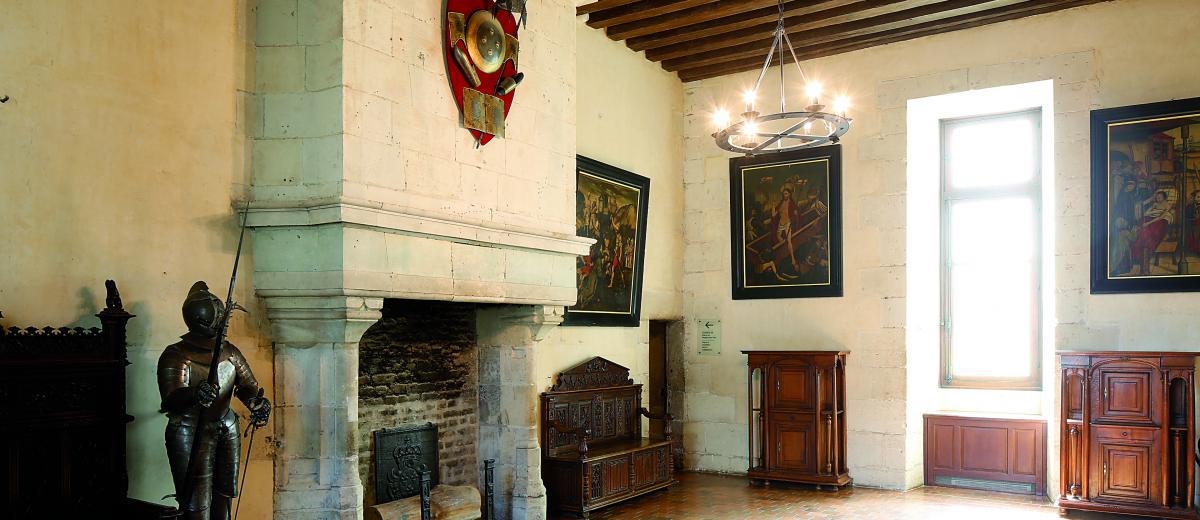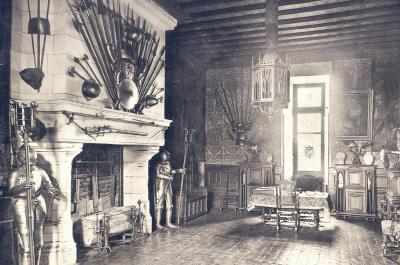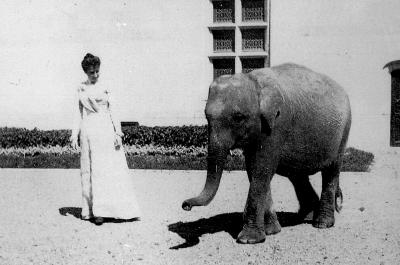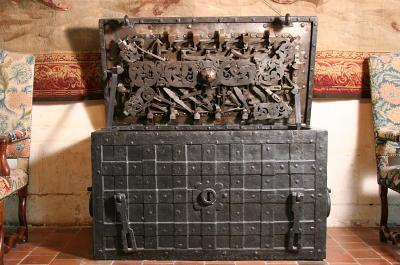In the 16th century, this room had a strategic place inside the Château and had three functions. Firstly, one had to pass through it to reach the parade room, a sort of security entrance where the sovereign's or lord's guards would be in attendance. Secondly, the guards used it for weaponry training. And finally, its window made it a good vantage point for keeping watch over the drawbridge, the park and the inner courtyard.
The de Broglies decided to decorate the room to commemorate its original function and made a series of acquisitions of weapons and armour dating from the 15th to the 19th century.
Above the fireplace, the shield, helmet and rectangular breastplates date from the late19th century. They were from the Ottoman Empire and were given as gifts by the Maharaja of Kapurthala to his close friend the Prince de Broglie. As for the Princess de Broglie, she received a female elephant called Miss Pundji.
Miss Pundgi
This pachyderm was a gift to the Broglie family from the Maharajah of Kapurthala. A two-year-old female elephant the size of a foal, she was despatched from Bombay by ship on the 24th of September 1898 and arrived at Marseille on the 9th of October.
She was accompanied by her first mahout and veterinarian Ping Hanny, who stayed with her for about two years. He would be replaced by a second mahout dispatched from India. After him, two local residents of Chaumont looked after the animal.
Expenses occasioned by the elephant (food and upkeep) were listed in all budget estimates from 1899 onwards. In the budget estimates for 1905, the “elephant” section is detailed as never before, as if the Domain’s steward, wished to make Prince de Broglie aware of just how much it cost to keep the pachyderm. In 1906, for the first time since 1899, the animal was not mentioned in budget estimates: the decision to part with her had been taken. Princess de Broglie gave the elephant to the Jardin d’Acclimatation in Paris.
In her memoirs, Prince Henri-Amédée de Broglie’s niece, Countess Jean de Pange, wrote that, during a stay she made at Chaumont in 1907, she “was most disappointed to learn that Pundgi the elephant was no longer in her aouda. Much to her sorrow, my aunt had been forced to send the animal to the Jardin d’Acclimatation. Pundgi had become bad-tempered following the departure of her last Hindu mahout. The elephant had spent almost 10 years at Chaumont and had been of some use, but ate as much as twenty horses (perhaps this is something of an exaggeration). But my uncle added, ‘Pundgi was without equal when it came to using her trunk to ferret out game hidden away in the undergrowth. We were sad to see her go, but much less so her mahouts. They felt miserable in Touraine. The local priest came round to the château all too often to complain about the trouble the seductive Hindus caused among the village girls.” Comment J’ai Vu 1900, Derniers Bals avant l’Orage, Countess Jean de Pange, Éditions Grasset, 1968.
Gabriel-Louis Pringué, a writer and close friend of the Broglies, was a regular guest at Chaumont. In his book Trente ans de dîners en ville (30 years of dinners in town), he mentions that: “one fine morning, due to carelessness and one of the administrators of her vast fortune’s taste for gambling, Princess de Broglie lost 28 million gold francs. She was only relatively perturbed by the loss and turned to her husband, saying: So I decided to do without foie-gras rolls at teatime. Not for one moment did she think of getting rid of her elephant, which consumed the daily rations of a good six horses.”
The safe chest
This safe chest was made in Nuremberg, Germany, in the late 16th century. It weighs 250 kilos, which made it too heavy to travel with the court when it moved from residence to residence. It was used by aristocratic families to store their important documents like charters, archives, property titles and notary deeds.
The lock, composed of 20 pins, is a very complex mechanism as the key had be turned four different ways to open the chest entirely. Inside, on the left, is a small inner safe with three locks for which a different key was needed.



